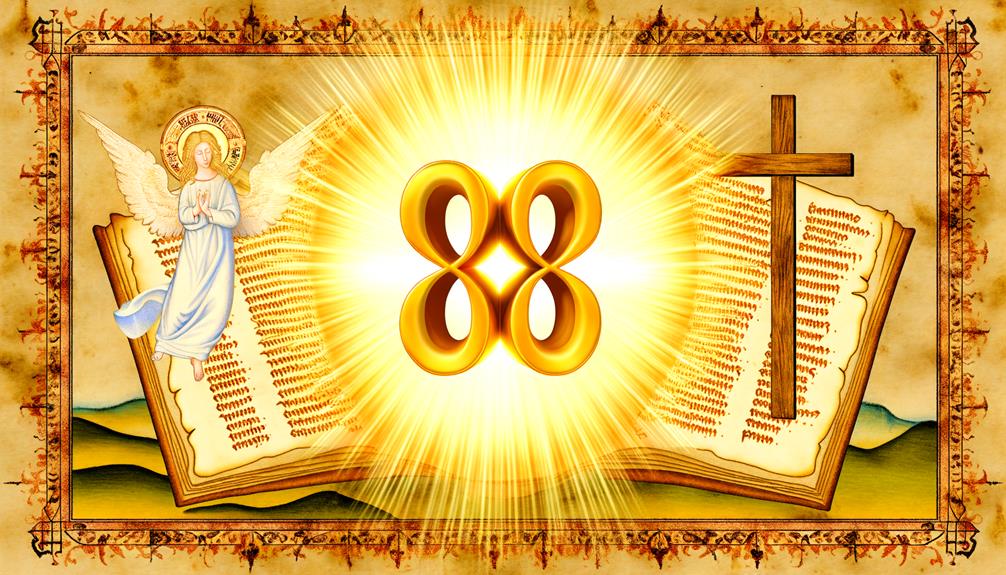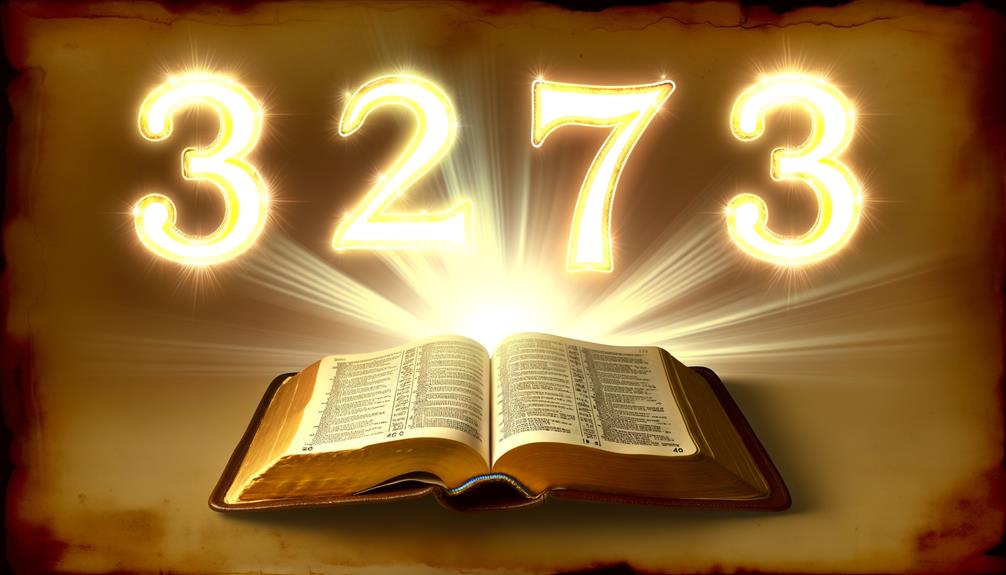888 Meaning in the Bible: Jesus and Eternal Salvation
In biblical numerology, the number 888 holds significant theological meaning as it corresponds to the name ‘Jesus’ in Greek, symbolizing resurrection, new beginnings, and divine completeness. The tripling of the number 8 emphasizes themes of infinity and eternal life, resonating with Christ’s victory over death and his eternal divine nature.
This number enriches our understanding of Jesus as the embodiment of spiritual renewal and transformation. Additionally, the symbolism of 888 aligns with broader biblical themes and narratives, offering profound insights into the essence of faith and redemption.
Continue exploring to uncover the deeper layers of this numerical significance.

888 Meaning in the Bible: Spiritual Symbolism and Divine Revelation
| Aspect | Meaning |
|---|---|
| Numerology Significance | The number 888 symbolizes perfection, renewal, and Christ’s divine nature. In biblical numerology, 8 represents new beginnings, and the triple repetition emphasizes divine completeness and infinity. |
| Biblical Context | Often associated with Jesus Christ, as the numerical value of His name in Greek equals 888. It highlights Christ as the source of salvation and eternal life. |
| Spiritual Insight | Encourages believers to embrace new spiritual beginnings, recognizing Christ’s role in renewal and eternal blessings. |
| Symbolism | Reflects abundance, divine perfection, and infinite grace, reminding believers of the eternal nature of God’s promises through Christ. |
| Message for Believers | A call to deepen faith in Christ, accept His infinite grace, and trust in the transformative power of salvation. |
Biblical Numerology Overview

Biblical numerology, a field of study that explores the symbolic meanings of numbers within the biblical texts, serves as a foundational element in understanding the deeper spiritual and theological messages conveyed through scripture.
Numbers such as 3, 7, 12, and 40 frequently appear in the Bible, each carrying significant spiritual implications. For instance, the number 3 often symbolizes the Trinity, while 7 denotes completeness or divine perfection.
The Number 888 in Greek

In the context of Greek numerology, the number 888 holds profound significance, particularly when reflecting on its symbolic representation in scripture.
The numerical value of the name ‘Jesus‘ in Greek is 888, thereby intertwining this number with the essence of Christ’s identity.
This association underscores the theological and spiritual implications of 888 within biblical texts, highlighting its role in conveying divine themes.
Greek Numerical Significance
The number 888 holds profound significance in Greek numerology, particularly in its symbolic association with Jesus Christ. In Greek isopsephy, each letter has a numerical value, and the sum of the letters in ‘Ιησούς’ (Jesus) equals 888.
This connection is not arbitrary but reflects a deeper theological assertion within Christian thought. The number 8 itself symbolizes new beginnings and resurrection, as seen in the resurrection of Christ on the first day of the new week.
Thus, tripling the number to 888 amplifies this symbolism, suggesting completeness and divinity. The numerical value serves not only as a theological statement but also as an example of the intricate interplay between language, numbers, and religious beliefs in the ancient world.
Symbolism in Scripture
Building upon the Greek numerical significance, the number 888 emerges in Scripture as a profound symbol embodying themes of resurrection, new beginnings, and divine completeness.
In biblical numerology, numbers bear spiritual and symbolic weight. The triplet form of eight not only intensifies its meaning but also aligns with the concept of infinity and eternal life.
Unlike the number seven, which signifies completion and rest, eight represents continuity and renewal. The recurrence of 888 can be seen as a deliberate emphasis on transcendence beyond the mundane cycle, offering a glimpse into the endless possibilities of divine intervention.
This numerical motif underscores a pivotal theological framework, accentuating the transformative power inherent in the sacred texts.
Jesus Christ Representation
Scholars of biblical numerology often highlight that the number 888 in Greek gematria corresponds directly to the name of Jesus Christ, symbolizing His role as the ultimate embodiment of resurrection and eternal life.
This numerical alignment is far from arbitrary; it reflects a profound theological assertion embedded within the text.
In the context of early Christian thought, the number 8 itself is emblematic of new beginnings and renewal, transcending the temporal cycle represented by the number 7.
Consequently, the tripling of this number—888—magnifies its significance exponentially.
Such an interpretation not only underscores the divine nature of Christ but also serves to reinforce the doctrinal teachings of His triumphant victory over death, offering believers a coded confirmation to His eternal sovereignty.
Jesus Christ and 888

Within the domain of biblical numerology, the number 888 is often associated with Jesus Christ, symbolizing His divine nature and the concept of spiritual rebirth.
This association stems from the Greek isopsephy system, where the letters in the name ‘Jesus’ (Ιησούς) sum to 888.
This numeric value contrasts with the number 666, commonly linked to imperfection and the Antichrist, thereby reinforcing the perfection and divine completeness of Christ.
The tripling of the number 8, itself a symbol of new beginnings and resurrection, further underscores Jesus’ role in the spiritual renewal of humanity.
Consequently, 888 not only emphasizes Christ’s divinity but also aligns with the broader theological themes of redemption and eternal life present in Christian doctrine.
Symbolism of New Beginnings

The symbolism of 888 in the Bible is intricately linked to themes of new beginnings, reflecting a numerological significance that transcends mere arithmetic.
This number serves as a profound emblem of spiritual rebirth, marking changes and fresh starts within the biblical narrative.
Understanding 888 in this framework provides deeper insight into the transformative power inherent in the Christian faith.
Numerological Significance Explained
In biblical numerology, the number 888 is frequently interpreted as a symbol of new beginnings and spiritual regeneration. This interpretation stems from its connection to the name of Jesus in Greek, where the numerical value of the letters in ‘Jesus’ (Ιησούς) adds up to 888.
This numeric association underscores the transformative and redemptive power attributed to Jesus Christ, aligning with themes of renewal and rebirth.
Additionally, the number 888 is seen as a tripling of the number 8, which itself is a symbol of new beginnings in biblical terms, as it follows the number 7, representing completion or perfection.
Consequently, 888 symbolizes a profound new beginning, emphasizing both continuity and an elevated state of spiritual awakening.
Spiritual Rebirth Insight
Recognized as a potent symbol of spiritual rebirth, the number 888 encapsulates the essence of divine renewal and the commencement of a transformative journey rooted in biblical teachings. This numeral resonates deeply within Christian theology, representing the resurrection of Jesus and the promise of new life. The repetition of the digit eight, a number traditionally associated with new beginnings, underscores the cyclical nature of spiritual renewal and the perpetuity of divine grace.
- Resurrection of Jesus: Signifies the ultimate rebirth.
- New Creation: Symbolizes believers becoming new creations in Christ.
- Covenantal Fulfillment: Denotes the fulfillment of God’s promises.
- Eternal Life: Embodies the promise of eternal life through faith.
This understanding invites a renewed perspective on spiritual transformation.
888 in Scriptural Context

Numerous passages within the Bible have been analyzed to uncover the deeper significance of the number 888, particularly in relation to its symbolic and theological implications. The number 888 is often associated with Jesus Christ, as it represents a tripling of the number 8, which signifies new beginnings and resurrection. This interpretation is derived from an extensive examination of biblical numerology and scriptural contexts. In addition to the resonance of 888, scholars have also explored the 821 biblical significance and interpretation, highlighting its relevance in various scriptural narratives. The number 821 has been linked to themes of spiritual awakening and the divine order, suggesting a deeper connection to mystical experiences within the faith. Both numbers, through their unique properties, serve as reminders of the complex layers of meaning found within the scriptures, inviting believers to engage in further contemplation and study.
| Passage | Interpretation |
|---|---|
| Genesis 17:12 | Circumcision on the eighth day |
| Leviticus 23:36 | Eighth day of the Feast of Tabernacles |
| Luke 9:28-29 | Transfiguration occurring after eight days |
| John 20:26 | Jesus’ appearance eight days after His resurrection |
| Revelation 1:8 | Christ as the Alpha and Omega, embodying eternal beginning and end |
These instances highlight the profound layers of meaning embedded within the number 888 in biblical texts.
Numeric Values in Names

Frequently, the numeric values assigned to names in biblical texts carry significant theological and symbolic meanings, often revealing deeper insights into the characters and themes presented. This practice, known as gematria, involves assigning numerical values to letters and interpreting these values to uncover hidden messages within the scriptures.
Names and words in Hebrew and Greek texts are particularly rich sources for such analysis, providing profound layers of meaning.
Key points of interest include:
- Significance of Numbers: Numbers such as 7, 12, and 40 frequently appear with symbolic importance.
- Gematria in Hebrew: The Hebrew alphabet’s numerical values often reveal theological insights.
- Greek Isopsephy: Similar to gematria, this practice applies to Greek texts.
- Names of God: Numerical values often underscore divine attributes.
Theological Implications of 888

In the context of biblical numerology, the number 888 holds profound theological significance, especially when examining the symbolic and spiritual meanings attributed to Jesus Christ within the scriptures.
The number 888 is often associated with Jesus, as the Greek numerical value of His name, Ιησούς (Iēsous), sums to 888.
This triadic repetition of the number eight symbolizes new beginnings, regeneration, and resurrection, all central themes in Christian theology.
The significance is further underscored by the fact that Jesus’ resurrection occurred on the first day of the new week, symbolizing a new creation.
Consequently, 888 encapsulates the essence of Christ’s redemptive work, reinforcing His divine nature and the transformative power of His resurrection.
Comparisons With Other Numbers

When comparing the number 888 with other biblically significant numbers such as 7, 12, and 40, it becomes evident that each numeral encapsulates unique theological and symbolic meanings that contribute to a deeper understanding of scriptural themes.
The number 7 often symbolizes completion and perfection, as seen in the seven days of creation.
The number 12 signifies divine governance, evident in the twelve tribes of Israel and twelve apostles.
The number 40 represents periods of testing and trial, such as the Israelites’ 40 years in the wilderness.
- Seven: Completion, perfection
- Twelve: Divine governance, authority
- Forty: Testing, trial, probation
- Three: Divinity, the Trinity
Through these comparisons, the number 888’s association with Jesus Christ is uniquely highlighted.
Modern Interpretations of 888

While the biblical significance of the number 888 is firmly rooted in its association with Jesus Christ, contemporary interpretations often expand on this foundation by exploring its relevance in numerology, spiritual symbolism, and modern Christian thought.
Numerologists frequently view 888 as a number of balance and cosmic harmony, signifying the cyclical nature of life and infinity.
In spiritual symbolism, 888 is sometimes seen as a representation of new beginnings and positive transformations, aligning with the teachings of Christ.
Modern Christian thought may interpret 888 as a divine reminder of Jesus’ eternal presence and the promise of resurrection.
These expanded views reflect a broader, more nuanced understanding that bridges ancient scriptural meanings with contemporary spiritual insights.
Conclusion
To summarize, the number 888 holds significant theological and symbolic weight within the biblical framework.
Representing Jesus Christ, it symbolizes new beginnings and divine completeness.
Examining 888 through the lenses of Greek numerology, scriptural context, and its numeric values in names reveals a rich tapestry of meanings.
Compared to other biblical numbers, 888 stands out like a diamond in the rough, offering profound insights into Christian theology and modern interpretations.
Such depth underscores its enduring significance in biblical scholarship.






